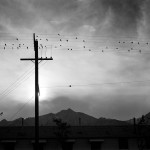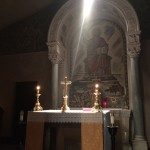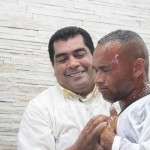“Who do you say that I Am?”
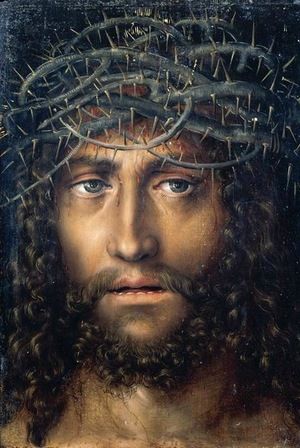
Let’s prepare ourselves for the end of the liturgical year, the Solemnity of Our Lord Jesus Christ the King:
God did not intend Israel to have a kingdom . . . The law was to be Israel’s king, and through the law, God himself . . . God yielded to Israel’s obstinacy and so devised a new kidn of kingship for them. The King is Jesus; in him God entered humanity and espoused it to himself. This is the usual form of the divine activity in relation to mankind. God does not have a fixed plan that he must carry out; on the contrary, he has many different ways of finding man and even of turning his wrong ways into right ways . . . the feast of Christ the King is therefore not a feast of those who are subjugated, but a feast of those who know that they are in the hands of one who writes straight on crooked lines. — Pope Benedict XVI
Readings: 2 Samuel 5:1-3, Psalm 122, Colossians 1:12-20, Luke 23:35-43
Let’s watch Fr. Robert Barron discuss:
Then read Pat Gohn on Christ the King:
First, we do well to recognize that we share in Christ’s kingship through baptism, when we were anointed as priest, prophet, and king. That is, the King of Kings has taken up residence within you, giving you a royal dignity, despite what your circumstances may look like . . . Second, calling on the grace of baptism, we must live out our baptismal call to holiness . . .When we recognize Christ as King in our lives, we recognize our fundamental dignity as the People of God. Like Dismas, such an understanding may have profound and eternal consequences.
The Church ends its liturgical year by honoring Christ the King, the Lord of Glory.
And within that same liturgy, St Paul’s epistle signals the coming Advent that rejoices in Him in whom all things hold together.
Oh, Happy Day!
If you’re done dancing, check out this excerpt from The Hidden Manna; A Theology of the Eucharist by Rev. James T. O’Connor

God the Father has put everything under Christ’s dominion, and he shall rule until all powers opposed to him have been subdued, the last of them being death itself (cf. 1 Cor. 15:25-26). This present stage of Christ’s rule is something we often profess in the liturgy (especially in the Feast of Christ the King) and in private devotion.
The meaning of the Lord’s subjection of all reality in its present stage is, however, something upon which most of us do not often reflect. It means that, in some mysterious but real way, the risen Jesus influences, shapes, and directs all things so that out of all persons and things he is shaping the future visage of creation as that creation moves toward his glorious return. Even the sinner—whose very sin is at least implicitly an attempt to thwart the sovereignty and dominion of Christ—operates now within the overall plan of the Lord for the establishment of his Kingdom. . . .
Over the lesser beings of creation his power sometimes is not necessarily more powerful (for his attractiveness and inspirations are powerful indeed) but more direct and immediate. And such is the case with the elements of bread and wine, simultaneously products of his creation and of ours, “fruit of the earth and work of human hands”. At the Consecration of the liturgy, the heavenly King touches these elements directly by and through the power of his Spirit. He touches them so mightily that—if we may put it this way—he extracts from them their very reality, dominating it and attracting it (forcefully pulling it even) toward himself, so subjecting it to himself that its own true being is lost to it as it becomes the very Lord who has mastered it.
The mystery of transubstantiation is a totally marvelous change but not one wherein the Lord descends from heavenly glory to “enter” under the appearances of bread and wine. Rather it is one in which he, not coming down, lifts the creaturely realities to himself, drawing them up to where he is now with the Father. He draws them to himself in such a fashion that he subjugates them and so transforms their own being that it becomes identical with his. The very being of bread and wine is lifted out of itself in a mighty spiral of ascent, is subsumed by and converted into the reality of Jesus seated in glory. By drawing the reality of all the elements scattered throughout the world unto and into himself, Jesus maintains his own bodily unity. The elements are changed into him, not he into them. If he did to the appearances, the species, what he does to the very reality of the bread and wine, then, once the Consecration of the Mass was finished, the priest would be left with nothing before him on the paten or in the cup, and Christ would appear in glory. For then not only the being but the very appearances that manifest that being to the world would have been subsumed into the exalted Lord, and human history on earth would have reached its conclusion.
Oh, my. That sounds like a book that needs to be added to our Advent Reading Selections.
And I am almost giddy in anticipation of the release of this book: Light of the World: The Pope, The Church and The Signs Of The Times.
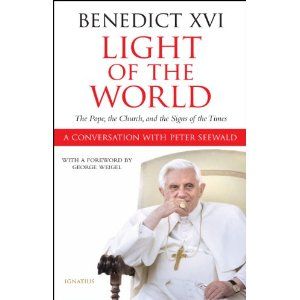
Anytime Peter Seewald and Joseph Ratzinger/Benedict XVI sit down to talk, the results are always readable, accessible, instructive and profound.


